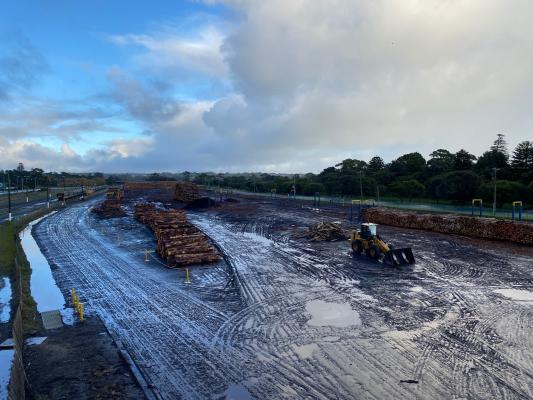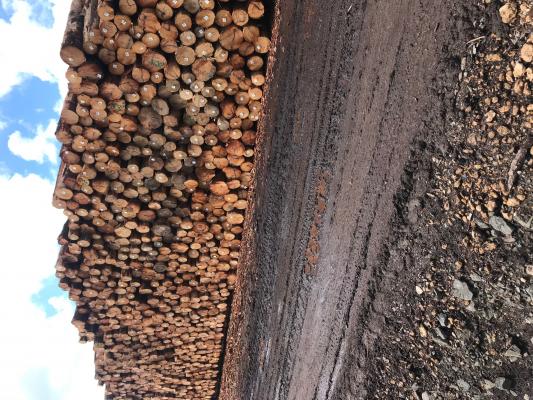
By Raquel Mustillo
SOUTH Australia’s peak timber processors association has questioned why log exports out of the Port of Portland have continued amid a nationwide shortage of structural timber.
But OneFortyOne plantations and the Australian Forest Products Association say local mills are already running at full capacity, with customers continuing to receive sawlog despite high demand for the product.
Demand for sawlog – which is the wood that can be processed into beams, planks or components of timber frames – has skyrocketed across the globe, with the finished product fetching prices 350pc higher than the same time last year in some international markets.
Photographs taken on April 26 at the Port of Portland show what South Australian Timber Processors Association chair David Quill described as “intense activity” at marshalling yards owned and managed by various forest companies.
Images taken on May 17 show what appears to be an increasing amount of log, with other images showing a half-empty wood holding yard.
“Obviously it is going to India because they are pursuing a market as the China ban on log exports continues,” Mr Quill said.
Port of Portland chief executive Greg Tremewen said there was “hardly anything” being exported from the Port of Portland and directed questions about volumes to OneFortyOne, HVP Plantations and Timberlands.
While HVP Plantations and Timberlands did not respond for comment, OneFortyOne said it had not exported structural sawlog since 2018 and had exported minimal quantities of pulp log this year.
Earlier this year, the South Australian parliamentary inquiry into the Limestone Coast timber industry heard there were two definitions of sawlog – with difference hinging on 15cm to 20cm in diameter.
But OneFortyOne executive general manager Australia Cameron MacDonald said a log that meets the diameter specifications of a structural sawlog was unable to be used for construction if it does not meet certain classification requirements.
” A defected log that does not meet all classification requirements for construction is classified as a pulplog,” he said.
“India is currently the only export market for OneFortyOne pulplog however due to COVID-19 disruptions there is no export of any log until the end of August.”
Mr MacDonald acknowledged while there was a short-term demand for structural sawlog nationwide, mill customers were continuing to receive the resource.
“It is our understating that Green Triangle mills are operating at full capacity,” he said.
Australian Forest Products Association deputy chief executive Victor Violante said Green Triangle sawmills had increased production as imported timber has been unable to fill the domestic gap due to global demand for framing.
“The fact is that all the timber framing sawmills in the Green Triangle are already working overtime, double shifts, and weekends at maximum capacity to try to meet the unprecedented demand caused by the COVID pandemic induced building boom which has been spurred on by incentives like HomeBuilder,” he said.
But Mr Quill said processor association members with sawmilling capacity would work a double shift if the resource was available and term of log supply was sufficient to justify increasing the workforce.
“There is no doubt provided that there was term associated with supply, some of the smaller processors would start a second shift and they could employ the necessary labour,” he said.
“The question that needs to be asked is why are we continuing to export sawlog from this country which would be suitable to meet our building requirements?”
SA-Best parliamentarian Frank Pangallo, who sits on the state-based timber inquiry, has called for an emergency summit next week to discuss the state’s timber stock and implications for the shortage.
“The country is desperately short of timber and we are shipping it offshore to India and Korea and eventually it is finding its way to the United States,” he said.
“There’s actually a worldwide shortage of timber at the moment, but we are feeling it pretty badly here.
“It’s almost a repetition of LPG gas, where we were shipping it out cheaply to japan, its being processed over there and then coming back here at a much more expensive price – it’s ludicrous.
“Federal and State governments need to realise just how important the forestry industry is in Australia.
“It is crucial and unfortunately not many pay attention to it because it’s not that visible but it will be when you suddenly can’t get buildings and homes completed or even started.”
The recently-completed Federal parliamentary committee into the timber supply chain has recommended the establishment of a voluntary code of conduct as well as an index of relevant log prices to facilitate access to timber by softwood processors.
The state-based committee is continuing to hear evidence as part of its inquiry, with a hearing scheduled for June 1.
HAVE YOUR SAY – editorial@tbwtoday.com.au









